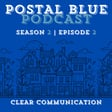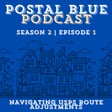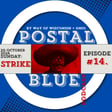Become a Creator today!Start creating today - Share your story with the world!
Start for free
00:00:00
00:00:01

The New Foundation
This episode, episode #1, incorporates things that has happened over the last 5 plus years in the postal service from my perspective and shows you, the viewer and listener where we stand now. From pre-covid to what happened during covid and what is going on since. We briefly speak on the current divide between management and the craft employees and more. Stay tuned for a lot more and catch us on YouTube as well.
#postalbluepodcast #usps #nalc #awpu #postoffice #postalservice
Recommended
Transcript
Introduction to the Postal Blue Podcast
00:00:20
Speaker
What's going on everybody. This is your boy with the official first episode of postal blue podcast of the postal blue podcast. I'm your boy LA AKA ice. Uh, today we are missing coffee. Coffee is definitely in my talk to him early. Now he's definitely in my, the time is going. It's almost seven 30 PM Sunday night and we do got to get this for you guys Monday morning. Who's going to be on your route or
00:00:50
Speaker
clarking handling of your material handler trucking if you're driving whatever it is you know what i'm saying so um and we're missing fee fee out of def in the family shout out fee kadolis has walked the fee family i'm saying she had a cousin house right now i just spoke with her so so like i'm soloing it again today
Current State of the Postal Service
00:01:11
Speaker
So today I'm just going to lay the groundwork. It's the official first episode. I'm going to lay the groundwork for what the postal service seems to be in its current form today. So once I set the groundwork on this episode, everything should make sense going forward that's on top of this. Right.
00:01:39
Speaker
Man, listen, the post office is at war, man. You know what I'm saying? We're in a severe state of decay. And while we're in a state of decay, almost like a recession business wise, we are also at war.
Challenges for Postal Employees
00:01:57
Speaker
My perspective as a company, right? And a lot of the things you experience is on the ground floor.
00:02:06
Speaker
which is where your craft employees are, right? Your clerks, your material handlers, your custodians, your truck drivers, your carriers, maintenance, which is like VMF. People who do maintenance on your facilities or maintenance on the vehicles, that's maintenance.
00:02:32
Speaker
I'm not sure I would have craft. I might be missing. There's like 17 different clerks. So I'm just putting them all together as clerks. Um, I think actual study custodians at one point was in the clerk.
00:02:47
Speaker
category and it was like in a maintenance category. So I'm not sure what custodians fall on. That's why I said I'm separate. We in a recession business wise, let me start there.
Financial Struggles and Management Pressure
00:03:01
Speaker
The post office doesn't know its identity right now. This is reality. The only thing that's left is
00:03:13
Speaker
getting whatever mail out with us, letter mail packages, whatever that is.
00:03:18
Speaker
It doesn't seem like we sell products anymore outside of postage. We don't really go to the extent of selling certified. We don't go to extent of selling express. We don't even bother right now in a new form of making sure that express even get to where they supposed to get to in a timely manner. We'll just ship it and then we just reimburse and express consistently right now in the current state of the post office, which is
00:03:47
Speaker
not making money, but it's kind of losing money because we didn't make money. You know what I'm saying? Like we sold this item for $70 and then we end up having to return the $70. But we paid the money in expenses to get that item from A to B. So actually we lost because we paid money to get it from A to B, but then we didn't recoup anything because we had to reimburse some people with that money.
00:04:12
Speaker
So we lose the money hand over fist, but that's as an entirety of the post office. And that's not due to just one, two, three particular crafts. That also has a lot to do with from our perspective. And in this case, from my perspective and the higher ups, like who's making these calls, who's selling these items, who's, who's creating the new items to sale.
00:04:33
Speaker
Right. And we don't know who that is on the ground floor. We don't know who that is and we don't see it. So we assume it's not getting done. So at this point, I don't believe that it's getting done. Right. So it looks like to make up money.
00:04:47
Speaker
that they're trying to squeeze, quote unquote, squeeze the craft employees. And that's not going to work. And that's what the war comes in that. Right. So the recession of the business part of the post office is what's initiating this war between management and craft employees.
Impact of COVID on Workforce
00:05:05
Speaker
Right. That's the foundation. The post office is bleeding money and they don't know how clearly they don't know how to make money. They don't know how to make money.
00:05:16
Speaker
which is the biggest deal. The post office no longer knows how to make money. It's from a ground floor perspective because it's not being made. We don't see it being made. I don't see it coming in on any aspect or any position that I've been in. I don't see it coming in. And I don't think I hear about is how we keep on losing money. So clearly we're not making anything outside of our contracts with
00:05:47
Speaker
UPS, FedEx, Amazon. I don't know if we got a contract with Walmart or not. At one point in time, I remember one year, we were seeing a lot of big influx of Walmart packages. I don't know if that was a one-time thing. I don't know if that was just doing that period. I don't know, Walmart just got their own people now for delivery, whatever that is.
00:06:11
Speaker
For a fact, I know if FedEx UPS FedEx not so much. I don't see anymore. So I don't I'm not sure about that one But at least I'm say I'm gonna say them for now FedEx UPS Amazon I think the biggest Influx of money is our is the contract with Amazon, right?
00:06:32
Speaker
But we're losing money as a company and we don't know how to make money or to recoup money clearly also as a company. So this is what initiated the war. Right. So I should have to do more for less because you higher up don't know how to make money. That's not going to work.
00:06:53
Speaker
and this is this is this is part of the core problem on the war between management and and craft employees um in its current form
00:07:06
Speaker
This job is not meant for a career. I didn't say job, but job slash careers both to each his own. This job is not meant for people that's not of a certain mentality, right? If you have a very immature mind state, it's my personal opinion.
00:07:29
Speaker
immature mind state, immature way of doing things. If you like to throw tantrums, if you like to complain without doing the work, because to me, as long as you do the work, you got the right to complain. But if you don't do the work, you don't really got the right to complain about nothing that you ain't did nothing to complain about. It's not meant for you. It's not meant for y'all.
00:07:50
Speaker
If you come in headstrong and you get your information, there's a lot of people who in the post office currently that has the information. This is the new post office, right? So there's not a ton of them. I will say that because we did lose a lot during COVID.
00:08:06
Speaker
whether retiring, quitting, or what have you doing, doing COVID. That's why I call it the new post office, because we don't have, we lost a big senior base of knowledge when it comes to those senior carriers, clerks, truck drivers, material handlers, people that was at 20, 25 plus years and higher, they left.
00:08:30
Speaker
Now, not every single one of them, mind you, but we lost from what I get thousands and thousands and thousands nationwide. That hurt the post office during that period of time.
00:08:45
Speaker
but would also hurt the post office during that period of time. It might seem like I'm jumping a little bit, but I'm getting into that recession part of the post office, the in-between leading into the war, right? So after this recession,
00:09:02
Speaker
the part when money's been constantly going down over whatever about the years, right? Then COVID hit, we lost a ton of personnel, and then we overworked the people that we did have, which would be the rest of those senior people, and that middle group of people that's like maybe 10, 15 years, and the new people that's probably like around the five year mark, so like five to 15 year mark. We overworked them, and then the people five years, unless we kind of threw them to the wolves,
Knowledge Gaps and Workplace Conflict
00:09:32
Speaker
Along with the new people or the influx of new people that's coming in kind of threw them to the wolves be sure that the trainings Put him up put him in whatever positions that they in and just hope they swim Right one and we've seen that across all crafts He believed consistently at that at that time. So Now you get past COVID
00:09:56
Speaker
where that middle group is kind of a little more on the senior side and those new people that came in with that bad experience they're kind of like in that middle group now and now you just got the the new new people coming in right now.
00:10:10
Speaker
So, what's consistent across the post office is majority, or what it seems like, majority of your more senior people, because they're super comfortable in their positions, they don't give information. Because they don't seem like whatever management is doing doesn't affect them.
00:10:30
Speaker
Right? They got whatever they got with this medical, with this restrictions, with this FMLA, with this, whatever the case is, they don't feel like they get affected. So whatever you might be going through in the middle group or the lower group, which is far, those group as far as time wise, you know what I'm saying?
00:10:48
Speaker
It's hard to get information, right? Because the other group, they don't really feel like they're being bothered. So you know what I'm saying? And you too knew for them to talk to or whatever the case is about sharing, sharing all type of information. So the bottom group was trying to get information from the middle group.
00:11:04
Speaker
in the middle group don't have all the information because they used to be the bottom group and who was they getting the information from when a lot of people was gone already, right? So you got to get the information. Now that's not to say that there's nobody with the information. There's a lot of people with the information. So you got to get close to those people with the information to ask questions. Ask a lot of questions when you come into the post office. Again, don't come in with the immature mindset. We don't need you. We do need people that come to work.
00:11:35
Speaker
And that's pun intended, you know what I'm saying? Because we also need people to come to work. We get a lot of people that don't come to work.
00:11:43
Speaker
people that call in, you just came in in 30 days, in your first 30 days, your first month, you done called in 12 times. You're getting two days off, that's eight days, then you call another 12, that's 20 days right there. So you only work 10 days in your first month? Nah, we don't need you. Sir and or ma'am, don't need you. That's just a hindrance. The post office is not built in a system to have a lot of backups, right?
00:12:06
Speaker
Also, if I didn't say this podcast is also for customers and residents, right? You don't get into things and topics or whatever the case is so you can have a better understanding on the industry, whether it's the truck drivers, the material handlers, the clerks, how to operate your backyard clerks, your window clerks, because we do have a lot of customers that have issues with their window clerks at their LPOs, which is your local post office.
00:12:34
Speaker
And more understanding of the carriers that you do have and or see or that you interact with on a daily basis. But this particular show, you set the groundwork for the employees, right? But there is a lot of information that you can take from that as a customer or a resident. Also, everyone at work at the post office are also customers and residents because we all have to live somewhere and we all still do get mail. So
00:13:03
Speaker
So the information, get the information, heed the information. Now, current state is we at war. All the crafts, this is what the crafts is talking about. We at war. It is what it is on the craft side. And management, we at war.
00:13:23
Speaker
And that is what it is on the management side. Now, at this point, everybody got to draw the line for whatever side that you want. Or you got to have a distinguishing trait that says that, hey, I'm with this side, but I'm not with this side, if that makes sense.
00:13:42
Speaker
Right. I'm over here doing my thing, but I ain't with the nonsense. You know what I'm saying? I'm just trying to do my thing. But with that understanding is you got to understand if you in that position that you still might be collateral damage. I'll explain a little bit later. You still might be collateral damage and don't get mad when you collateral damage. You know what I'm saying? We all got to pick our side. Right. Um.
00:14:09
Speaker
People in crafts feel like they're being, I'm not gonna say forced, but attempted force to do things that they don't wanna do, per se, right? Or let's say being harassed in various ways or stages of their workday, right? And that's not gonna be tolerated. There's laws that state that management need to know that.
00:14:34
Speaker
There's a fine line between you doing your job as a supervisor or manager and you harassing someone. You as a supervisor or manager need to know what that line is so you know when you close to it or when you crossed it. Just because I'm in the workplace and you feel like whatever you feel don't mean that you can harass me. You can speak your piece that don't give you no right to harass me. You can lose your job, sir, and or a man.
00:15:02
Speaker
Make that clear, right? This is what they have the EEO portion of federal employment for. So EEOs is for supervisors. You can be fired by a craft employee on losing the EEO. You can be fired, sir, and or ma'am.
00:15:22
Speaker
I'm telling you, you can be fired, you can be moved, you can be retrained. If that person has a serious enough case and they cross their eyes and dot their T's when they went in their office, whenever they win, whatever they ask for, this is from personal conversations with the EEO department, whatever they ask for as long as it's not something that should already be happening, right? Let's say as an example,
00:15:52
Speaker
I should, if I win my EEO, let's say you was harassing me. I shouldn't ask for, I need him to stop harassing me or I need him or her to stop harassing me. They gonna say, well, they shouldn't be doing that anyway. Pick something else.
00:16:03
Speaker
you got to pick something else. That's what I mean by you can't act for something that should be happening in the first place, right? This is what leaves the door open to settlements, you being retrained, you being moved to a different location, or you being removed from the post office, right? Them the big four.
00:16:24
Speaker
Craftside, this is from my personal experience, you need to be going for those big four. Really big three, because I really wouldn't accept being retrained, me personally. It's happened before, once I've accepted retraining, but at this point, some people just needs to go.
EEO Process and Employee Rights
00:16:45
Speaker
That's gonna be the change in the post office. Some people just need to go. So definitely being moved or removed should be the top two.
00:16:54
Speaker
You could take the settlement or ask for a settlement but That allowed that person that we need out the post office to stay in the post office. So It's a catch 22, you know I'm saying we like we like greed we people we human we got bills We got whatever the case is and then we taking money I can't tell the next man I'm saying not not to take it or whatever the case is but if you plan on staying that's not something that we should be
00:17:24
Speaker
we should be accepting at this point in time if we playing on staying and growing the post office, right? As much as they'll try to, the management will try to weed out the craft, the bad craft employees, craft needs to start weeding out the bad management employees, which are still employees, right? About picking the side. Let me, let me break that down real quick. Supervisors, management,
00:17:51
Speaker
When it comes to management supervisors, you are the shield for management, right? You're the first step. You don't want to deal directly with employees, not the manager per se. Managers can, but that's not their position. Their position is facility vehicles, right? Supervisors, through all aspects of most businesses, are the ones that deal with the employees. They typically don't go over to the manager unless it's something that the supervisor cannot handle.
00:18:21
Speaker
So the floor supervisors, that is your responsibility. It's not your manager responsibility, technically that's your responsibility. Now I'll say this for a reason.
00:18:32
Speaker
There are a lot of cases where your manager, and unbeknownst to you, will use you, right, in cases, like a shield, to have you do something. That's not to say that you're doing something that you shouldn't be or whatever the case is. It's just letting you know, right? And give you instructions to do it. I need you to address this carrier. I need you to address that clerk. I need you to go do this. I need you to do these days in court. I need you to pull this person. I need you to put, okay, cool. And you do that, right? This is me. This is my personal take on it.
00:19:02
Speaker
If you willing to put paperwork on an employee, then you kind of threatening a job. Now that's not a threat in a bad way on like, I need to, I feel like I need to see you, right? But that, that's, that's threatening my employment, which is threatening my income, which is threatening my household expenses, um, that I got to pay what I got to take care of. Right.
00:19:27
Speaker
That's what it is at the end of the day. Um, and y'all shouldn't shoot those threats like, right? Because when I want to, if I'm a craft and when I want to get back at management, I feel like I'm going to get back at them because there's a lot of things I probably been overlooking or let slide. And now y'all want to put paperwork on me, right? First, the first, uh, line of defense, that supervisor, I hit you first to get to the manager.
00:19:52
Speaker
You the shield. I did through you, I can get to the manager, easy.
Power Dynamics and Grievances
00:19:56
Speaker
I can actually jump, skip you like it's checkers and go straight to the manager. But because you want to put paperwork on me, right? Your name is on that paperwork. I might hit you first. Pause if necessary. I might hit you first and then go to the manager. So then don't get mad when I put paperwork on you. I've seen that happen. I've seen it happen. And then the supervisor asks, but man, why you got to do this to me? Why are you all trying to put that? Because ain't your name on my paperwork, on my write-ups?
00:20:22
Speaker
Okay, don't you do this that you're not supposed to do? Don't you leave early? Don't you come in late? Okay, they pulled your clock ring, sir. It looks like you still clock in at 10 and you didn't get here till 11. So this looks like you still in time, right? You came in at 12 and it looked like you left the building at five. It say you're in towards at nine or eight.
00:20:47
Speaker
whatever your auto rain punch is. Is that still in money? Is that still in time? Because that's what y'all will try to hit a craft employee with. So y'all gotta watch what y'all doing because once craft employees who know all the tea in the post office, everything that you're doing, mind you, let's clarify. A station is filled with craft employees way more than management.
00:21:10
Speaker
Right? Typically, let's say a station has 20 routes. So that's probably five, 10, 15, 20. So that's about 25, 24 employees, right? One for each route. Let's say it's a full station. One, a carrier for each route. And then you need four utilities to rotate through those routes on the off days. That's 24 employees. And then you probably have two to three, let's say three clerks. Right? So that's 27.
00:21:38
Speaker
possibly a custodian. So now that's 28. Let's say you might have two PTF that you might send to other place, PTF slash CCAs. So now we at 30, we had 30 employees already. And most likely that station has two supervisors and a manager. So it's three management and 30 employees. Paperwork on you management can stack up fast when you've aggravated
00:22:03
Speaker
30 employees. Mind you, a strong 10 out of that 30 is all it takes. It takes less than that because I've had people retrain just on my own. It didn't take nine of us.
00:22:15
Speaker
right as a carrier didn't take nine of me didn't take five of me took one me to get two supervisors and a manager retrained. That's just that's all I asked for just to be retrained. And I set back and I let things happen and watch for three to four weeks. And I took notes on when on days I was harassed, I watched discrimination happen.
00:22:37
Speaker
I'm not gonna say in ways right now. We'll say that for a future episode. I watched things happen. I took notes on days, on times, okay, on treatments of certain individuals versus myself. Then a lot on myself. I took notes for three to four weeks. Then I called the EEO consultant, talked to them. Okay, cool. Got all my ducks in a row, put in my EEO.
00:23:04
Speaker
with the man. Listen, it was bad in the office. It was bad in the office. Also, when you do go EO from the craft side, you are allowed to represent it. You could choose that to be a union steward. From what I was told, you could choose it to be anybody, right? But you could choose a union steward. You can choose a lawyer if you want to.
00:23:24
Speaker
Anything of that nature that it's all up to you. I don't think it has to be one of those two You probably could choose a friend that kind of know a little bit about your situation I don't they didn't say anything against that again I was told it could be anybody that you want to the quote-unquote represent you right? I would think the biggest two would be your steward or
00:23:47
Speaker
with somebody in the union or a lawyer, depending on what you're looking for. Make sure you know what you're looking for before you go in there, right? Make sure you know what you're looking for as far as the outcome goes before you go in there, right? And if you got a strong enough case, which again, take your time, build your case. So it shouldn't be no if you got a strong enough case.
00:24:10
Speaker
When you go in there, I got you like, you know what I'm saying? When the feds come for you, what they say, they already got you. By the time the feds get to you, they done already got everything that they need. They ain't just started the case. They probably been watching you for months, years, or whatever the case is at this point in time, right? You do the same thing when you do your EEOs, right? And I say that to say this, there's bad supervisors out there.
00:24:35
Speaker
There is supervised that harass that's borderline harassing or that is harassing employees. I'd never expect managers to write up their supervisors or to get rid of their supervisors. This is what makes it work, right? Because someone in management can tell a steward, man, you know that this person should be wrong because they do this to another.
00:24:58
Speaker
And that steward could tell the manager, let's say it's a manager, but you know your supervisor should be wrote up for this than the other, but you haven't done it, right?
00:25:07
Speaker
So management, you get looked at like you're together, right? A manager, you should be managing everyone in the office. Let me, let me say that again. Managers should be managing everyone in the office, meaning carriers, clerks, custodians, and supervisors. They all should be performing at a certain level or they all should get paperwork put on them. All of them.
00:25:36
Speaker
That's my belief. All of them. Not just manager want to go after the craft employees, but then don't say none to the supervisors. So then that's what makes it look like management is together because your supervisor bogus, but you don't never say none or do none to your supervisor. Okay. So now when I get this paperwork, that we're going to see what it is. Same thing. Same scenario when it comes to supervisors and managers.
00:26:01
Speaker
A lot of supervisors know that they managers might be bogus or doing bogus things or shady things, but they don't say nothing. They don't do nothing. Now, from the craft side, you wouldn't possibly know that, right? But most supervisors don't go to they NAF representative to put paperwork on, on, on they managers. We know this for a fact. I've seen supervisors get talked to crazy by they manager or managers and then go do nothing. Then go do nothing, violating all types of dignity and respect, discrimination, harassment, and they don't do nothing.
00:26:31
Speaker
Don't do nothing. Like they got Stockholm syndrome. Okay, cool. So y'all together. Y'all watch each other back. You know, y'all all bogus. So it's all bogus system. The manager and the supervisor, bogus system. Okay, cool. So then when I shoot this shot, supervisor prepared to get hit because you know the manager be bogus. What manager, you know, supervisor be bogus, but y'all both sit back and y'all do what y'all do. Okay, cool. So y'all together.
00:26:57
Speaker
So this is where the separation comes in. Crafts gonna be with craft and management gonna be with management. Management is supervisors and hire, right? That's EAS, red badges is what I'm talking about. Even when you as a two or four B, if you sit on that desk,
00:27:16
Speaker
The day you sit on that desk, I'm hoping that you come correct because if you let that supervisor send you off, or EAS send you off, if you let a manager send you off, I will put paperwork on you as a 204B. I would make it so you would never want to be on the desk again.
00:27:31
Speaker
Right? That's what I'm willing to do. Right? So y'all gotta pick your size again. You know what I'm saying? It is what it is at this point in time. Wish it wasn't like that, but there's a lot of favoritism being done, a lot of biases being done, there's harassment, hostile work environments, all type of stuff that's going down. And it's going to be the year going into 2025 that that's going to have to change.
00:27:54
Speaker
it's gonna have to change you if we expect the post office to progress. And a lot of this stuff doesn't get changed within the ranks of the post office. Sad to say, right? But it's not gonna be tolerated. You gotta go outside the post office. This is where the EEO start to come into place
Motivation Behind the Podcast
00:28:11
Speaker
at. You gotta start bringing in outside forces to see what's going on inside. Because there's a lot of things inside that upper management is you gonna try to keep inside. They pray and hope that it don't get outside.
00:28:22
Speaker
This is where the idea for this podcast come into place. I've been thinking about this for about a year now. Probably longer than that and just never did it. I've seen a couple other podcasts. I think the post office got its own official podcast called Melanin, I believe. I think it's their actual official podcast. I'm not sure if that's like
00:28:50
Speaker
I don't know. I know you could go on a website inside of which and it has a texture. So I don't know if it's like part of the post office that that's doing that or whatever the case is or somebody that they contracted or I don't, I don't know.
00:29:01
Speaker
But and then there's like one or two other podcasts that I've seen that's like post office oriented, not saying YouTube videos, actual like podcasts. It's been around for a while. Yeah. But they only do shows like once a month or something like that. That's not I don't think is USPS affiliate. So again, this is the ground floor, man. If you don't.
00:29:27
Speaker
If you don't wanna be clad or damaged, get out the way, right? Supervisors, get out the way. Distinguish yourself from management or it's up. On the craft side, listen, craft employees. Not everything, let me clarify, not everything is harassment. Management can manage you. It's within a certain,
00:29:54
Speaker
Degree, but they can manage you. If you're doing something that you're not supposed to be doing or you're doing something incorrectly, they can address you without you feeling some type of way. If you're doing something wrong, they can correct you, right? That's not harassment. That part is them doing their job.
00:30:13
Speaker
Right? So to a degree, in a lot of cases, follow your instructions, especially if you know you're doing something wrong. I think part of that is a lot of people don't know that they're doing anything wrong because they don't have that information. This goes to what I was saying earlier.
00:30:27
Speaker
Not everybody was trained the proper way to do things, so some people might not know how to properly do things. So then when it's addressed, even though you've probably been getting away with it for weeks or months or whatever, by this point in time, you feel like somebody might be picking on you and they might not be. You know what I'm saying? They're probably just trying to correct the behavior that they see you doing. That is incorrect. Know the difference. This is where you ask questions at.
00:30:51
Speaker
And if the closest people to you, which should be like a union steward or the person that trains you, if you do have a rapport with your supervisor, because not all supervisors are bad. A lot of them you can get a lot of information from, or should be able to get a lot of information from. It's supposed to be almost like the in-between on the higher management in the floor.
00:31:12
Speaker
But we're not seeing that a lot, but I won't put everybody in management. It's just like just bad people and I won't put everybody on the craft as bad people. That's that's not the case or bad employees on either side of the post office. Right. But we do got something to go above and beyond on being it's not informed or not good employees and whatever.
00:31:37
Speaker
craft or non-craft, speaking of supervising managers, that they're in.
Legal Rights and Harassment Definitions
00:31:42
Speaker
Whatever their respective job titles are, I'd say it like that. But yes, they do have a right to manage. They do have a right to supervise. They do have a right to correct.
00:31:52
Speaker
Um, they do have a right to address. Um, if they pull up on you on the street, it could be a street ops. That's not them, um, trying to walk you. So no, you don't, they don't need to give you a 24 hour notice to pull up on you and see, see how much mail and stuff you got or to see, or to watch you, uh, do a split or two.
00:32:14
Speaker
that that's not they're not walking you and counting your mail so you don't need a 24 hour foot and that's a regular street observation that's something that management should be doing they should be doing more often as far as like just going to the street and seeing what the carriers are doing walking around the station seeing what their clerks are doing
00:32:29
Speaker
If you downtown walk on the floor, seeing with your clerks and or PSEs and your, I mean, not PSEs, your clerks is very, again, it's various types of clerks. It's like 15 to 17 position. Last time I looked, it could be different depending on where you at. When I last looked at the craft breakdown for clerks, it was like 15 to 17. I can't remember which one of the numbers. I remember like, dang, it's many different types of clerks.
00:32:53
Speaker
But seeing what your clerks and material handlers are doing and things of that nature. Truck drivers, they're under something kind of different.
00:33:04
Speaker
But I guess when they get you to your station, you know what I'm saying? You can make sure that they do what they supposed to be doing or just being safe on whatever it is that they supposed to be doing or whatever the case is. Truck drivers, I think, fall under headquarters or whatever the main station is that's like your headquarters. They fall under them. So their situation is a little bit different, but I mean, we all still got contracts and whatnot with the APWU.
00:33:30
Speaker
But yeah, not everything is harassment. Not everything is harassment. Management do have the right to do their jobs, which they are being paid to do. Management has to know though, there's a fine line between doing your job and harassing someone.
00:33:45
Speaker
Your job is not above the law, sir, and or a man. Just because, let's say, let's say I'm a carrier and I'm at my, this brought up a little bit a few days ago, actually yesterday when I was talking to a supervisor. If I'm at my case and I'm working, right, you can't keep coming to my case asking me what's taking so long.
00:34:08
Speaker
You can't keep doing that. Like if we talk about once day to day or a couple of times here and there, whatever the case, that's not harassment. But if I'm, let's say I'm in the office an hour and a half and you come over here 10, 15 times, bro, you harass me at this point. At this point in time, I feel uncomfortable with what you're doing. I am working. I am working. Then you supervise him, I say. Yeah, but what's taking so long? Sir, am I, am I not working?
00:34:35
Speaker
I don't have to move at a certain pace that you want me to move at. If that's contractual, show me that. Because I can show you paperwork that says that there is no pace. There is no pace. Right? I work to what's comfortable and safe for me to do. What's comfortable and safe for me. I have a bundle of mail in my hand and I'm casing that.
00:35:04
Speaker
whatever it takes me to case that is, whatever it takes me to case that. You can see what I'm doing from wherever you at across this, in this station. You don't have to keep coming up to me in this case and berating me with your language. And you're saying, what's taking so long? Clearly, if I'm being over here working this entire time, then it's clearly the mail is what's taking me so long. That don't even make sense that you would ask me that. That's how I'm gonna come off. So I'm letting you know now,
00:35:33
Speaker
I'm feeling uncomfortable, and I'm feeling like you're harassing me in the manner in which you're doing what you're doing. That's all it takes. Now, if you keep coming over here after that, this is where you get hit with harassment, because I just told you I feel uncomfortable. Now, if you don't believe that if you're on the management side, you might want to go look up the definition of harassment. You might want to go look up the definition of a hostile work environment.
00:35:59
Speaker
If you want to be in management, you need to know these things. You also might need to know the laws that goes for harassment hostile work environment on the federal side. Cause the post office rules and regulations do not supersede federal law. Federal law says no federal entity or organization is allowed to have a hostile work environment. There's a zero tolerance policy. You might want to look up what zero tolerance policy means.
00:36:26
Speaker
In general, it means anybody caught creating or allowing a hostile work environment is termination. That's what zero tolerance means. There's no second chances. There's no talking about it. If it's proven, you're fired. That's federal law. And nothing that you do in the post office supersedes federal law. This is how you end up getting fired in EO's. You know what I'm saying? Or moved. This is how that happens.
00:36:55
Speaker
Now, if you want to take the chances on that, you take the chances on that. I don't expect managers to fire the supervise. I don't expect hire managers to fire the managers. Guess who can fire managers and supervisors though? Craft employees have the power to fire management. As long as it's done the appropriate way. And as long as it's right, you can do it.
00:37:20
Speaker
Easily done. Right? But again, not everything is harassment. Not every single thing could be a discrimination. On the craft side, know what harassment is. Go look up the word in addition. Well, y'all got smartphones now. So look it up online.
00:37:40
Speaker
Harassment, look up, hostile work environment. Those the two, or you in, in look up discrimination. Right? Look up discrimination. Those the three. Both sides should know, know that. So y'all are in the, are in the loop on what can happen to you. And well, management, what can happen to you? And from the craft side, what, what, what are your chances or choices are?
00:38:10
Speaker
Right. But yeah, that's the word, right? That's the ground foundation to everything that we'll be talking about going forward that's layered on top. This is what comes from this. So whenever you hear a certain thing said from the management side or the carrier side or the craft side, it's a lot of seeds, man. Clerks, carriers, craft from the craft side and from management side.
00:38:37
Speaker
There's a distinguish, there's a difference. And some people can walk that line and some can't. Some people can walk that line and some can't. You gotta be strong enough to walk that side. I personally went onto the management side to get knowledge and to think that I can make a difference.
00:38:59
Speaker
I'm currently a carrier myself. I am, I am a carrier. I've been a two or four B and for, I've been and is kind of sorted at times, a two or four B still.
00:39:14
Speaker
I've been a supervisor opener. I've been a closing supervisor I've been I've supervised the station opening and closing the whole station in one day I've been in a so I've been acting supervisor I've also been an active manager kind of sorta I Would I don't think they would ever give me that title? But I've been in the station by myself for weeks at a time with no other supervisors just me I
00:39:41
Speaker
Right. So I'm assuming I'm kind of like the active manager. If I'm the only person in management in this entire station for weeks at a time, opening and closing and I'm doing the manager work along with the opening and supervisor work the entire time for weeks at a time by myself. Um, and in those period of time, I have, uh, garnered a lot of knowledge and I am thankful because I did get a lot of information when I was on that side on how to do things. Um,
00:40:07
Speaker
the right way from certain people in management, from certain supervisors and certain managers, gave me information on how I do these, how I do these things properly in the computer work and how I get here, how I get there, how I maneuver this and move this around,
Workplace Dynamics and Mismanagement
00:40:22
Speaker
this and that. Shout out to area two. Area is the people that's kind of over certain things in your facility in safety.
00:40:35
Speaker
right and that was people I was able to talk to in an area right the safety part about delayed mail and what what is and we and what's not delayed mail and how do you go about reporting that in the proper ways which is actually probably two or three different ways that post to always be done in tandem meaning like at the same I ain't gonna say at the in tandem at the same time but
00:40:58
Speaker
All three supposed to be done you post report mail this way this way in this way all three were for every time, right? But that's the information I had to get because again at that point time I was in the position that I was never in and ain't nobody around me to get it because there's nobody else here But me so I'm boots on ground learning learning learning
00:41:18
Speaker
I think what helped me a lot with that was my military background. Right. Me and coffee, both former military, myself, Army and coffee is Marine, former Marine. Right. So I learned a lot and I took that to the floor. And because anytime I'm on the desk when I've treated well, I have to say anytime I have been on the desk,
00:41:45
Speaker
in whatever seat I've been in, I've treated my people a certain way, so even when I'm back down, they make sure to come to me, hey Leonard, how can I do this? If this is going on, what should I do? The proper way, they ask me, what should I do if this is going on? I say, well, if this is going on, I'm not guaranteeing that that's going on, I'm not in the situation. If this is going on, you make sure to do this, do this, do this, this is what you do.
00:42:10
Speaker
I've told supervisor when I've been around, I said, hey, if a carrier is doing this or if a clerk is doing that, this is what you supposed to do, right? From the craft side, I've said, hey man, you should get written up. You should get pulled into the office. You should get whatever the case is.
00:42:26
Speaker
But I go by is the contract for better or for worse. And there's things I do not like in the contract by any means, but there's things I do like in the contract, right? So you gotta take and you gotta give.
00:42:42
Speaker
One of the biggest discrepancies is management don't want to give. Management has some things that work so they benefit the contract and the things that don't work in their benefit, they try to mismanage. The term that's in the post office, mismanagement. I never heard of mismanagement before I came to the post office. I've only heard of mismanaging when I come to the office. What the heck is mismanaging? What is mismanaging?
00:43:08
Speaker
This manages when they don't go by the contract and they try to manage around the even though so they're breaking the contract and they Consistently break the contract to try to do things that they know they're not supposed to do by the contract Right, but they still expect you on the craft side to uphold the contract meaning right let's say Let's say Let me try to get an example, right
00:43:44
Speaker
Let's say somebody bring back meal, right? Let's say I'm a non-vowel on the curious side. A non-vowel is a non-overtime volunteer. I mean, I did not sign up for overtime. I don't want it. Now, for you non-vowels.
00:43:58
Speaker
Contract does states that they can force you, but it don't say they enforce you two hours. I think about it says they can force you. They can't force you into penalty, meaning they can force you two hours or more. You know what I'm saying? Depending on whatever it takes you up to your 10 hour mark, meaning they can, they can attempt attempt quote unquote management attempt to give you like a 30 minute pivot or quote unquote, whatever chart some of y'all would do, try to give an hour pivot in two hours over time.
00:44:25
Speaker
So you should be back at 5 30 if you'll start times like 7 30. That should be a 10-hour day for you, right? So let's say that's the case. That's that's the example I think about we're gonna take someone gave me an hour pivot in two hours of overtime All right, we down by now I don't know if the overtime vowels and max or whatever the case is but the contract says I can't be forced independent Right, so I'm gonna send a message back at 12 if I can't make this our pivot Hey, and I make this our pick
00:44:54
Speaker
Right. And I'm gonna keep going.
00:44:58
Speaker
And I don't know if they respond or not in this scenario. So I'm going to do my two hours overtime. I come back at five thirty or before five thirty. I should be actually coming back around probably close to ten minutes before. Hopefully trying to get back about ten minutes before because you got to clean up and disperse and do your dispatch, which is your your PM mail and your your outgoing. And I'm going to bring you back. You go this hour that you all gave me.
00:45:24
Speaker
They gonna try to say, let's say they try to say, oh man, you gotta do that hour. Nah, I don't have to do that hour by the contract. I'm gonna give you instruction. This is the mismanagement, right? Because you know that you can't force me because the contract states I cannot be forced into penalty. And what you're trying to do is force me into penalty. This is where we gonna bump heads now. Management, I'm gonna just try to use, I'm gonna give you an instruction.
00:45:53
Speaker
This is them mismanaging. So you know that you're trying to violate the contract. You just don't care enough to work within the contract. It's not my fault that y'all gave me three hours inspecting me to do three hours and two hours. That's not my fault. That's your fault, but you don't want to be responsible for it not being done. That's why I sent you a message at 12. At 12, you should have said, hey man, it's sending somebody to come get the hour from you, PTF, CCA, whatever the case is.
00:46:18
Speaker
Whatever you want to do with it. That's what you should have did but you didn't have nobody for whatever reason this that other songs and so on so in this scenario I brings back to you now me. I'm not being forced independently if I don't want it as an eye of all you can choose to go over Right. That's your choice still agree with that's your choice me if someone talking to me now feeling certain way I feel like you talking to me crazy. I'm not choosing to do it. I'm not doing it. I
00:46:44
Speaker
I'm not finna, again, this is where we gonna walk a line at though. Cause I'm not gonna tell management, no. Do not tell management, no. Right, you can ignore them if you want to. There's nothing that I ever seen in no type of paperwork outside of some type of job discussion where you're doing a day and quarter, whatever the case is that says that I have to, that I have to conversate with management.
00:47:06
Speaker
You can ask me questions on the floor. I don't know. You know what I'm saying? Like, I'm going to be within my right. You know what I'm saying? Listen, you ask me something I got to do with my right, I'll talk to you.
00:47:15
Speaker
Something I got to do with mail? Okay, cool. When it get to this type of things, I'm not talking to you. And there ain't, I ain't seen no paperwork that says I have to talk to you. I'm just telling you what it is. I'm not being forced into penalty. Also, you're not, so you're gonna fail to follow my instructions. I'm not being forced into penalty. And I'm gonna do my put back mail when he, she's saying whatever they saying, doing my put back mail, this, that, and so on, so on, so on, so on. I'm clocking out and I'm leaving the premises. I see y'all, if y'all don't do day in court, I see y'all in day in court tomorrow. That's how I'm, that's how I'm carrying it.
00:47:44
Speaker
And then the day in court, because you got to notate everything that I'm saying. I'm gonna make sure to clarify everything that I'm saying very clearly. So it's reported. My rights was broken. My contract was broken. Then why do you fail to file your instructions? Management tried to break the contract and they tried to force me to do something that the contract say that they cannot force me to do. So I upheld the contract. I don't know what management did.
00:48:14
Speaker
But while you fail to follow your instructions, I cannot be forced into penalty. So to me, that's an invalid instruction, right? Not all instructions are valid instructions management.
00:48:27
Speaker
I fight you on that. I ain't lost. I ain't lost it yet. I fight you on that. Not all instructions are valid instructions. You can take it however you want to take it. Learn your craft, learn your position, learn your title. Y'all, a lot of supervisors don't know the M. Y'all don't know the contract. Y'all don't know what you're supposed to do and what you can't do.
00:48:48
Speaker
Cause y'all never did none of the reading that says what you can do and what you can't do. Y'all just go with whatever the supervisor told you that to do or whatever the manager that told you to do and you don't even know what you can or can't do. This is how y'all be in a situation that y'all be in. Go read the book, man. Ladies and gentlemen, ma'am and or sir, you know what I'm saying? They have that knowledge out there when you in management. Go read the book on what you can and can't do.
00:49:15
Speaker
You might need to learn some type of federal laws too on what you can and can't do that pertains to working in the federal government.
Mental Health and Work Stress
00:49:22
Speaker
And you might need to go read some OSHA policies as well. And from my experience, a lot of people on the desk don't know those. Those three things, a lot of people on the desk don't know.
00:49:32
Speaker
I came from military background. I knew a lot of federal laws. We had to know those to know what you can, can't do, and how much trouble you'll be in if you did certain things in certain places. So I know a lot of the federal laws on what you can and can't do, right? So, and again, USPS, rules, regulations, policies, whatever, don't supersede no type of federal law. These are just policies. These are rules and regulations. They got nothing to do with federal law. A lot of y'all stuff don't even supersede OSHA rules and regulations.
00:50:03
Speaker
Y'all really drawing the short end of the stick. So on the craft side, get knowledgeable. Learn your rules in the work environment. You don't have to learn everything. There's just certain things that you have to learn that you keep in a tuck. And this is what you use when you gotta go fight in your days in court, whether you're on the management side or the craft side.
00:50:23
Speaker
All right. I was trying to make this thing 30 minutes. It turned out to be God dang 50 minutes. Thank God. Anywho, so this is where we get because I'm going to get up out here. This is where we at. I might title this. I don't know what I'm tired of this yet, but it's going to be going to be a title.
00:50:44
Speaker
But, but yeah, man, so right now we at war, man, we went through a, we went through kind of like a recession period, great depression period with COVID. And it was a tough time during COVID and we lost a lot of people. We lost a lot of business and we haven't come out on the brighter side of that since COVID. I get COVID about a two year span, a little longer, but just for the time sake, I get about a two year span.
00:51:07
Speaker
And we didn't, clearly we didn't win in that, in that exchange. And post office don't know how to do good business. When it comes to actual business, we don't make new products. We don't make better products. We ain't got nothing to sell. It seems like, I don't know what, what department that is, that they should, if it's not a department, it should be a department that y'all just create products to sale.
00:51:30
Speaker
I don't know what's going on with that. And in the midst of this budget, let's call it a budget crisis that the upper management is having that's spreading down to the lower end. Only thing they've been able to come up with is trying to get craft employees to do more work for no pay or less pay.
00:51:58
Speaker
That's that's something they've come up with. Crack down on craft employees, try to get them to do more. And they say in the same period of time, try to get them to do more. So out there, y'all do have a lot of a lot of craft employees that might be tired, that might be overworked, that might be stressed mentally, going through it emotionally with a job. If I even want to be here or not, and you thinking about it, you debate and then you just get another day at work. So while you work and this is on your mind, so you do got carriers or clerks.
00:52:28
Speaker
front counter clerks, rear distribution clerks. And then downtown, you got your different clerks, along with your material handlers and headquarters, you got your truck drivers that's going through it mentally, emotionally, about the job while still at work trying to do the job. And everybody can relate to that, you know what I'm saying? We usually got a bad day at work and you got some household things going on, but you still at work and your mind just not there on those days because
00:52:55
Speaker
It's just not there and ain't nothing that you can do to necessarily get it there outside of try to focus. But when things on your mind went heavy on your heart, you know what I'm saying? It's just be long days. You know what I'm saying? The post office is going through it right now. And so when you do see all carriers out there as deliver mail, make sure you put appreciate your carriers, man. There's a lot of a lot more people could be gone.
00:53:19
Speaker
and they just trying to get through it from day to day. Try to deliver this meal, deliver these packages and try to get home, attend to their families, their girls, their guys, whatever y'all into, you know what I'm saying? Your kids, take care of your moms, your dad, you know what I'm saying? Your elderly parents or whatever the case is and try to get up the next morning and go back to work.
00:53:39
Speaker
Same thing with your front counter clerks. You go in, sometimes your clerks might be having a bad day. It might just be one of those days. There's nothing personal. Nobody should be disrespecting anyone on either side. But they might not be the most chipper. They might not be the most happy. They might not be the more, you know what I'm saying? They might not be wearing a smile that day. They might be going through it that day. Could be very, very well be work related. You know what I'm saying? We're trying to decide if this even for me still or not.
Future of the Podcast and Listener Engagement
00:54:06
Speaker
And as we lose more people, it's hard to get more people in. So when you lose somebody, you could be missing that person in that spot for a long time. Well, it's a fair amount of time. And when you do get somebody, they might not be good. And that person might not last. So the people we have, we need to be trying to keep. That's also part of the post office of rotating door issue that we got going on.
00:54:31
Speaker
But outside of that man, yeah, anybody welcome to do to do to Join the live. Let me say like that to join alive We gonna be recording postal blue on Sundays I'm gonna try to get these uploaded and well we gonna try to get these uploaded and they're gonna Be out for y'all every Monday morning. I think I'm gonna pick the 9 o'clock slot
00:54:56
Speaker
by then everybody pop should be like in a group, right? So not nine o'clock, maybe 10, 10 sounds better though.
00:55:07
Speaker
10 South, I'm gonna do nine. We gonna do nine, right? So nine o'clock on Mondays, nine o'clock AM Mondays for y'all. And then maybe Wednesday, we'll do a live spaces, right? And then a live spaces, anybody in a craft or anybody on management can come up and talk or whatever the case is, the regular host, me, coffee, fee, it's gonna have to be at nighttime of course.
00:55:35
Speaker
Cause we all work in the morning. Um, even in a maybe late afternoon or early evening, try to get that out the way. Um, so it ain't too late at night, hopefully. Um, and then we're just going to do a lot of spaces with, you know what I'm saying? Just, just chit chatting about just regular things, whatever the case is. If you work for the post office, if you're a customer resident, you know what I'm saying? That's interested. Make sure you join. Um, and anybody that is willing to come up, they want to do a live interview at that point in time. We're kind of like an interview, asking any type of questions.
00:56:04
Speaker
We will bring people up that's on management side and the craft side. Um, I was going to do a lot of spaces last week, but I really wanted to do this show first just to set the groundwork. Um, from both sides when these lives happen and these types of spaces happen, um, with these chances come up, let's be respectful to everybody, no matter what side they're on.
00:56:26
Speaker
Right. So let's watch our language. Let's try to as we are trying to do. Right. Me and me and coffee don't curse. He kind of like created his own words. Y'all hear him. If y'all if y'all ever listen to ice coffee or be initiated, he kind of created like his own cuss words where he don't actually curse, but feast and he curse. So.
00:56:46
Speaker
I don't know. But me and Fi curse, especially Fi, right? But for the purpose of these shows, and it's here, we try not to curse. I mean, they say cursing shows a sign of the lack of vocabulary. So we try to work on that definitely, and we need this to spread to as many as possible. So we definitely don't need the limitations of having certain type of languages or certain type of words used hindering that, right? So we're trying to watch the language. So in the spaces,
00:57:15
Speaker
You know what I'm saying? Cursing is cursing, you know what I'm saying? But we're gonna try to watch the language because again, we're trying to be respectful of all sides, right? So if you're a craft and you see a supervisor come up and talk in the question, you know what I'm saying? Be respectful.
00:57:31
Speaker
You know what I'm saying? Be respectful, you know what I'm saying? Ain't nobody on there gonna get away with nothing. Ain't how we rock, you know what I'm saying? So again, you talking to people that's been on the management side and craft side of both. So, but I'm gonna definitely get some supervisors up there, some people, some managers up there. We definitely gonna get some craft employees up there throughout the week.
00:57:54
Speaker
see what they got going on throughout the week. See if they got some issues that we can help them with or assist them with. We're going to have some union stewards from different crafts up there. All type of stuff, you know what I'm saying? That's what's coming on the live shows. So that'll be on, I want to say Wednesdays right now, maybe Thursday. I'm going to do Wednesday, maybe Thursday.
00:58:17
Speaker
And then you get all something to listen to, you know what I'm saying, in the middle of the week, and then we hit y'all back with Monday again for another one, right? So going forward, all the shows gonna be dropping on Monday. You still got iced coffee coming back for season two, unjustified behavior, and you got postal blue, which is new, everything gonna be dropping on Monday. You gonna catch the, if you wanna quote unquote watch,
00:58:45
Speaker
Sometimes it used to be live recorded, but not as much. But if you want to watch it, it will be on YouTube. But outside of that, it will be hopefully on all streaming platforms. So whatever you listen to, you'll be able to find all three of the shows on there. But if you're going to YouTube, you'll be able to find all three just on the YouTube channel, Amazing Studios.
00:59:03
Speaker
which I haven't put a lot into, but I'm starting to put a lot over there. So y'all just be able to go to one particular area and find all three of the podcasts, really more than that, but find the main three of the podcasts over there in the midst of waiting for the website.
00:59:20
Speaker
to finish, right? It's gonna be a lot of stuff. I got a lot of stuff coming. A lot of valuables coming for employees, postal worker employees, and all types of stuff like that. All type of media things. Just make sure y'all stay tuned, you know what I'm saying? So make sure you hit that subscribe button. Make sure you follow. Make sure you share. Sharing is caring. And we gonna be out here, man.
00:59:45
Speaker
I thank y'all for listening. Make sure y'all come get this knowledge. And hey, pick your side, man. Pick your side and stand on that side. It is what it is. To the end, we out, man. I appreciate y'all. Thanks for listening. Later.



















